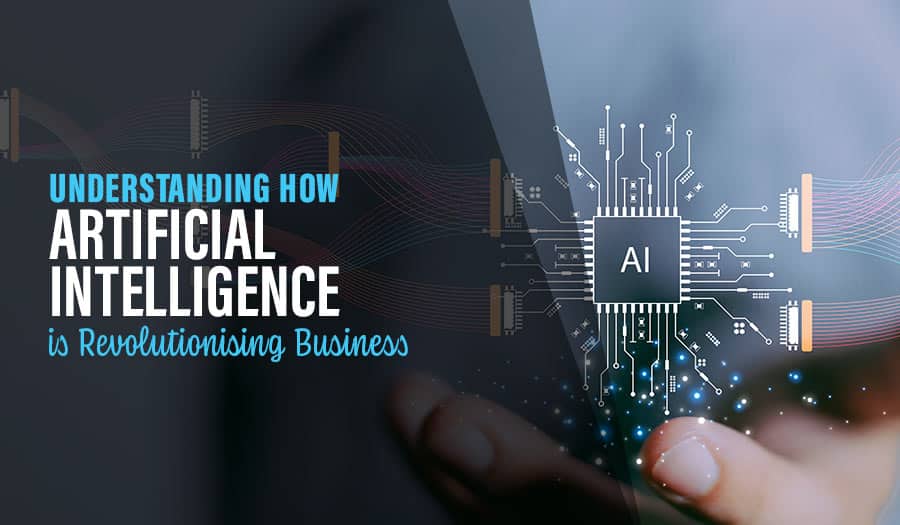Business AI is changing how organisations operate. It automates routine tasks, analyses large data sets, and improves customer interactions.
As a result, businesses can work faster, make better decisions, and deliver more personalised experiences. This article explains how AI is used in business, the benefits it delivers, and the challenges leaders need to manage.
How Artificial Intelligence is Revolutionising Business: Key Takeaways
- Business AI increases efficiency and reduces costs by automating tasks, improving analysis, and personalising customer experiences.
- AI now supports marketing, supply chain, and HR, optimising processes and creating new growth opportunities.
- Successful adoption depends on managing data privacy, bias, and ethics through responsible AI practices.
Defining Artificial Intelligence in Business
Artificial intelligence refers to software that performs tasks normally requiring human intelligence. These tasks include learning, decision-making, and problem-solving.
Key subfields include machine learning, which learns from data, and deep learning, which uses layered neural networks to analyse complex patterns. In business, AI supports people rather than replacing them. Instead, it processes large volumes of data and assists with complex decisions at speed.
Natural Language Processing (NLP) allows systems to understand and generate language. As a result, customer support, sales, and marketing benefit significantly. In addition, generative AI creates text, images, and other content by learning patterns. Therefore, it opens the door to new products and services.
Today, AI-powered assistants and digital agents are embedded in daily workflows. Consequently, teams can strengthen their competitive edge.
Key Benefits of Implementing AI in Companies
When businesses adopt AI, they often see immediate improvements in efficiency and decision-making. AI can analyse data quickly, highlight insights, and support faster responses.
As a result, organisations benefit from higher productivity, lower operational costs, and smoother internal processes. In addition, customer interactions become more relevant and personalised.
Enhanced Data Analysis and Insights
AI tools analyse large data sets to uncover trends and patterns that humans may miss. Predictive analytics, for example, can forecast customer behaviour and demand using historical data.
However, because AI processes detailed individual information, businesses must balance insight with privacy. Therefore, clear policies and strong security measures are essential.
Automation of Repetitive Tasks
By handing repetitive work to business AI, employees can focus on higher-value activities.
Today, virtual assistants already manage data entry and common enquiries. Over time, AI systems are expected to take on more advanced operational tasks. As a result, workflows will continue to evolve.
Personalised Customer Interactions
AI improves retail and eCommerce by tailoring recommendations and support. Chatbots and virtual assistants answer routine questions around the clock. Meanwhile, human agents focus on complex issues.
As models improve, customer satisfaction and loyalty tend to rise. Ultimately, these personalised experiences become a strong competitive advantage.
Applications of AI Across Business Functions
AI now plays a role across most business areas. It automates tasks, improves accuracy, and supports data-driven decisions in everything from finance to healthcare.
Common applications include marketing and sales, supply chain management, and human resources.
Marketing and Sales
AI analyses customer behaviour, search trends, and engagement data to guide real-time decisions. It supports content creation, campaign optimisation, and personalised CRM experiences.
As a result, businesses can improve engagement and increase conversion rates.
Supply Chain Management
In supply chains, AI forecasts demand and optimises inventory levels. This reduces both stock shortages and overstocking.
In addition, automation improves speed and resilience across logistics and fulfilment operations.
Human Resources
AI simplifies recruitment by screening candidates, scheduling interviews, and supporting onboarding. Training programs can also adapt to individual learning needs.
When implemented carefully, AI helps HR teams work more efficiently. At the same time, it supports fair and inclusive processes.
AI Tools for Customer Service and Support
Chatbots and virtual assistants handle common questions, route enquiries, and personalise responses. At the same time, sentiment analysis highlights recurring issues in customer feedback.
Together, these tools reduce response times and improve satisfaction. Meanwhile, staff can focus on more complex cases.
Machine Learning for Financial Analysis and Trading
Machine learning models process market and economic data to identify trends and risks. Techniques such as regression, decision trees, and neural networks support pricing, forecasting, and trading strategies.
As a result, financial teams gain stronger insights and faster decision support.
AI in Enhancing Cybersecurity
AI strengthens cybersecurity by identifying unusual behaviour faster than traditional systems. As a result, it plays a key role in threat detection and fraud prevention.
Threat Detection and Prevention
AI analyses network activity in real time. Therefore, organisations can detect risks earlier and respond faster. In addition, systems can trace incidents back to their source, which supports stronger prevention strategies.
Fraud Detection
By identifying abnormal transaction patterns, AI reduces fraud risk and protects financial systems. Consequently, this proactive approach helps maintain trust and stability.
AI as a Creative Force
Beyond operations, AI supports creativity in art, music, and writing. Generative models produce images, compose music, and assist with content creation.
Popular creative AI tools include:
- Generative Adversarial Networks (GANs) for images, video, and audio.
- Neural Style Transfer to blend artistic styles.
- AI-powered writing tools for data-driven content creation.
Process Optimisation with AI
Process optimisation using AI focuses on:
- Process mining to identify bottlenecks.
- Workflow automation to reduce errors.
- Predictive analytics to plan proactively.
As a result, businesses achieve leaner processes, higher productivity, and more consistent outcomes.
Challenges and Ethical Considerations of AI Adoption
Despite its benefits, AI introduces important responsibilities. Key challenges include privacy, security, fairness, and workforce impact.
Businesses should start with clear use cases and small pilots. Then, they should measure results carefully. Clear guidelines for responsible AI use help protect both customers and the organisation.
Data Privacy and Security
Transparency is essential when AI affects customer experiences. Privacy, security, and accountability must be built in from the start.
The Australian Cyber Security Centre offers practical guidance in this area. In addition, AI outputs should always be reviewed before use. This reduces errors and supports compliance.
Bias and Fairness
Bias can emerge from data quality or system design. Therefore, organisations need regular audits, diverse teams, and ongoing human oversight.
These steps help ensure fair outcomes and long-term trust.
Future Trends and Opportunities in AI
Advances in natural language processing, multimodal models, and AI agents continue to expand what is possible. For example, new releases such as Google’s Gemini highlight how quickly capabilities are evolving.
As roles change, some tasks will disappear. However, new ones will emerge. Growth areas include analytics, climate technology, and cybersecurity.
AI-Driven Innovation
Predictive analytics guides the development of products and services that align with emerging demand. At the same time, businesses must address ethical risks to innovate responsibly.
General AI Assistance
More flexible AI assistants will support multiple business functions. As a result, teams can work more efficiently while unlocking new creative opportunities.
Summary
Artificial intelligence is transforming business through better analysis, automation, and personalised experiences. It now plays a central role across marketing, supply chain, HR, finance, and cybersecurity.
To realise these benefits, organisations must manage privacy, security, and bias responsibly. By staying informed and adaptable, businesses can maintain a strong competitive advantage.
How Artificial Intelligence is Revolutionising Business: Frequently Asked Questions
What is AI and how is it applied in business?
AI enables systems to perform complex tasks that improve efficiency, decision-making, and customer experience across business functions.
How does AI improve data analysis and decision-making?
AI analyses large data sets to uncover insights and predict trends. As a result, it supports faster and more informed decisions.
What are the ethical concerns associated with AI?
Key concerns include privacy, security, bias, and job impact. Therefore, responsible AI requires transparency and accountability.
How does AI affect job markets and employment?
AI automates tasks while creating new roles. As a result, upskilling and innovation help organisations and workers adapt.
What are the future trends in AI technology?
Expect stronger language models, general AI assistants, and deeper integration across analytics, climate solutions, and cybersecurity.
Take your business to the next level with a Pixel Fish Website.
Check out some of our latest Website Design projects.
Further Information
Why you should use Elementor for your new WordPress Website
How AI Technology Could Impact Your Business In The Future
Embracing Tomorrow: How the Future of AI Video Is Here with Open AI’s Sora
10 Website Navigation Tips to Help You Improve User Experience
Discover What is WordPress: A Complete Beginner’s Guide
Mastering Website Design: A Comprehensive Guide
WordPress and Ecommerce: Top Tips and Tools for Success





